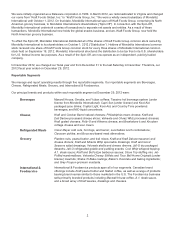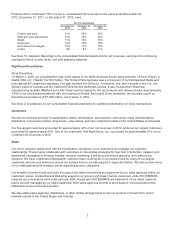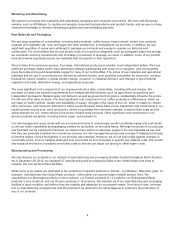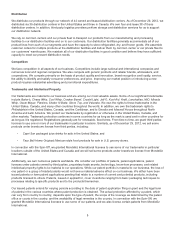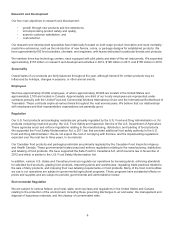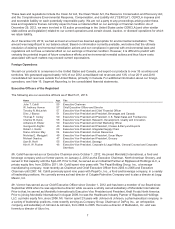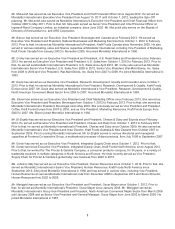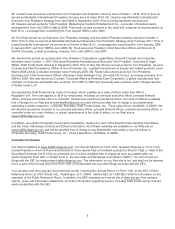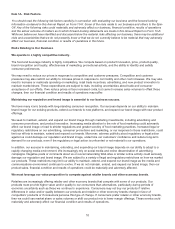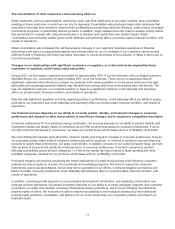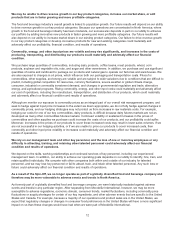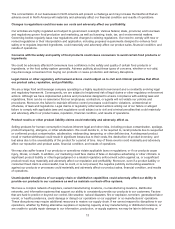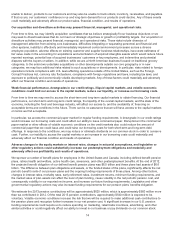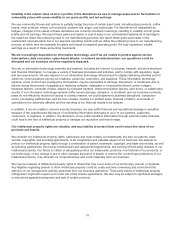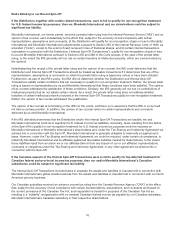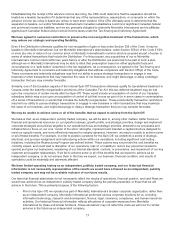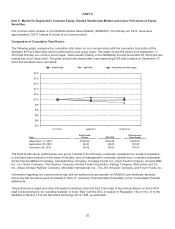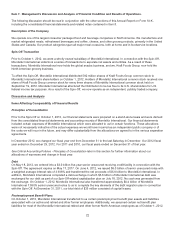Kraft 2012 Annual Report Download - page 14
Download and view the complete annual report
Please find page 14 of the 2012 Kraft annual report below. You can navigate through the pages in the report by either clicking on the pages listed below, or by using the keyword search tool below to find specific information within the annual report.We may be unable to drive revenue growth in our key product categories, increase our market share, or add
products that are in faster growing and more profitable categories.
The food and beverage industry’s overall growth is linked to population growth. Our future results will depend on our ability
to drive revenue growth in our key product categories. Because our operations are concentrated in North America, where
growth in the food and beverage industry has been moderate, our success also depends in part on our ability to enhance
our portfolio by adding innovative new products in faster growing and more profitable categories. Our future results will
also depend on our ability to increase market share in our existing product categories. Our failure to drive revenue growth
in our key product categories or develop innovative products for new and existing categories could materially and
adversely affect our profitability, financial condition, and results of operations.
Commodity, energy, and other input prices are volatile and may rise significantly, and increases in the costs of
producing, transporting, and distributing our products could materially and adversely affect our financial
condition.
We purchase large quantities of commodities, including dairy products, coffee beans, meat products, wheat, corn
products, soybean and vegetable oils, nuts, and sugar and other sweeteners. In addition, we purchase and use significant
quantities of resins and cardboard to package our products and natural gas to operate our factories and warehouses. We
are also exposed to changes in oil prices, which influence both our packaging and transportation costs. Prices for
commodities, other supplies, and energy are volatile and are subject to wide variations due to conditions that are difficult to
predict, including global competition for resources, currency fluctuations, severe weather or global climate change,
consumer, industrial or commodity investment demand, and changes in governmental regulation and trade, alternative
energy, and agricultural programs. Rising commodity, energy, and other input costs could materially and adversely affect
our cost of operations, including the manufacture, transportation, and distribution of our products, which could materially
and adversely affect our financial condition and results of operations.
Although we monitor our exposure to commodity prices as an integral part of our overall risk management program, and
seek to hedge against input price increases to the extent we deem appropriate, we do not fully hedge against changes in
commodity prices, and our hedging strategies may not protect us from increases in raw materials costs. For example,
hedging our costs for one of our key commodities, dairy products, is difficult because dairy futures markets are not as
developed as many other commodities futures markets. Continued volatility or sustained increases in the prices of
commodities and other supplies we purchase could increase the costs of our products, and our profitability could suffer.
Moreover, increases in the prices of our products to cover these increased costs may result in lower sales volumes. If we
are not successful in our hedging activities, or if we are unable to price our products to cover increased costs, then
commodity and other input price volatility or increases could materially and adversely affect our financial condition and
results of operations.
We rely on our management team and other key personnel, and the loss of one or more key employees or any
difficulty in attracting, training, and retaining other talented personnel could adversely affect our financial
condition and results of operations.
We depend on the skills, working relationships and continued services of key personnel, including our experienced
management team. In addition, our ability to achieve our operating goals depends on our ability to identify, hire, train, and
retain qualified individuals. We compete with other companies both within and outside of our industry for talented
personnel, and we may lose key personnel or fail to attract, train, and retain other talented personnel. Any such loss or
failure could adversely affect our financial condition and results of operations.
As a result of the Spin-Off, we no longer operate as part of a globally diversified food and beverage company and
therefore may be more vulnerable to adverse events and trends in North America.
As formerly part of a globally diversified food and beverage company, we were historically insulated against adverse
events and trends in any particular region. After separating from Mondele¯ z International, however, we may be more
susceptible to adverse regulations, economic climate, consumer trends, market fluctuations, including commodity price
fluctuations or supply shortages for certain of our key ingredients, and other adverse events that are specific to the United
States and Canada. For example, because a majority of our operations and product sales are in the United States, we
expect that regulatory changes or changes in consumer food preferences in the United States will have a more significant
impact on us than these changes would have had when we were part of Mondele¯z International.
12


